To get these updates in your inbox, subscribe to Footnotes and Tangents and turn on notifications for the Cromwell Trilogy.
Welcome to week eighteen of Wolf Crawl
This week, we begin the second book in the Cromwell Trilogy: Bring up the Bodies. We are reading the first chapter, “Falcons, Wiltshire, September 1535.” The king and Cromwell are at Wolf Hall. Weston is out the window and Jane Seymour is in the garden.
You will find everything you need for this read-along on the main Cromwell trilogy page of my website, including:
Weekly updates, like this one
Online resources about Mantel’s writing and Thomas Cromwell
These posts are free for all, thanks to the generosity of paying subscribers who support my writing and this slow book group. Supporters can read my series of posts on The Haunting of Wolf Hall, and start their own discussion threads in the chat area. Thank you so much for all your support.
This is a long post and may get clipped by your email provider. It is best viewed online here.
In this week’s post:
This week’s story
This week’s characters
This week’s theme: Game on
Footnote: ‘His children are falling from the sky’
Tangent: ‘We may have one more fine day.’
Footnote: Cut from a different cloth
Footnote: On the education of women
Footnote: Dead Man’s Plack
Footnote: Cromwell vs. Boleyn
Footnote: Hearts and minds
Tangent: Weston’s Ghost
Quote of the week: Root bride
Next week
Last week’s posts:
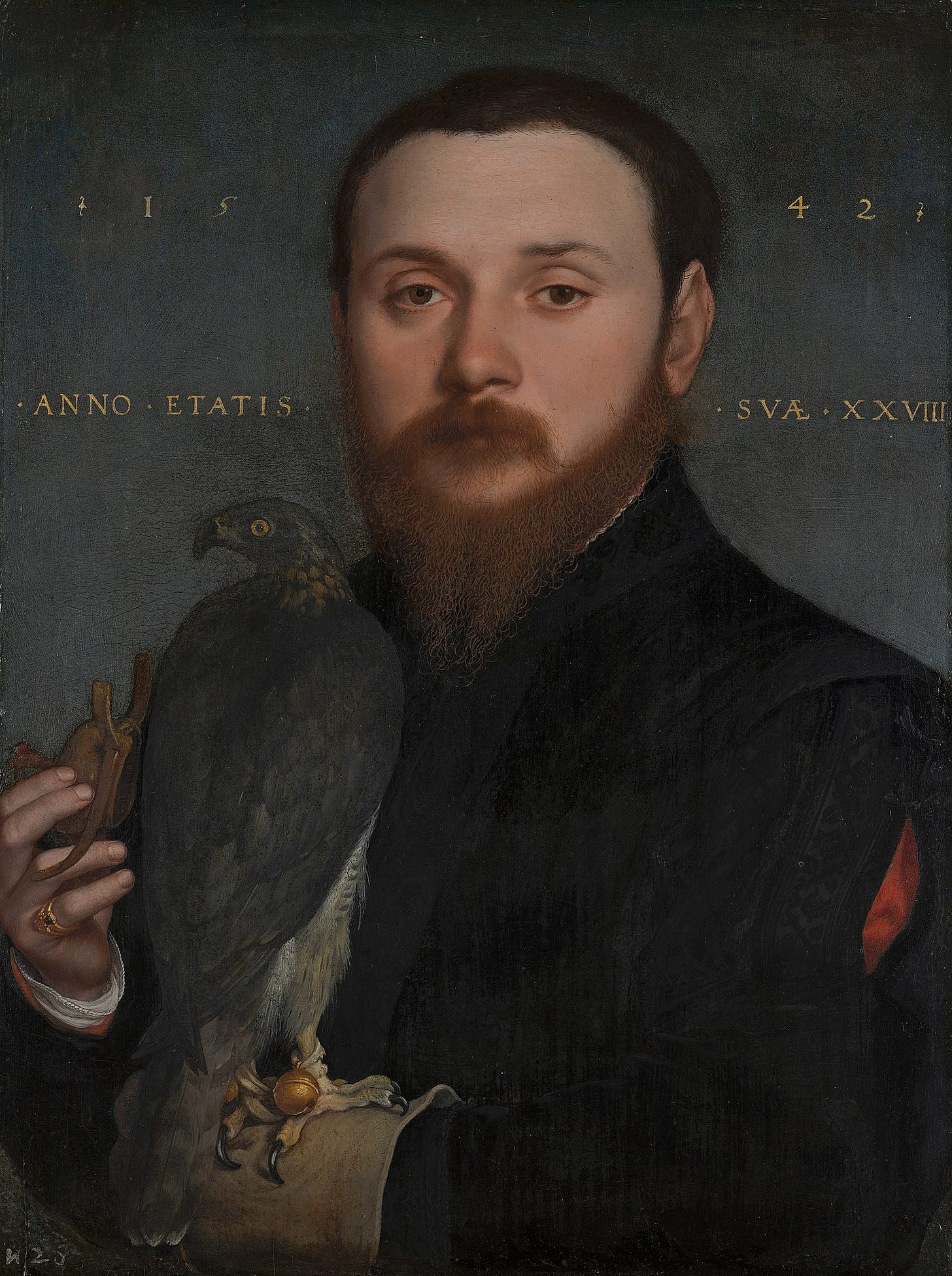
1. This week’s story
Wiltshire, September, 1535. Cromwell is with the king as the court progresses through the home counties. The days are taken up with hunting and falconry, the evenings with entertainment, and the nights with the business of England.
This day, the king has lost his hat. In deference, everyone has gone bareheaded and is now sunburnt. Everyone except Master Secretary, who has the skin of a lily.
The king is with the Seymours of Wolf Hall. Old Sir John boasts that his daughters are “great hunters” but are not troubled by an education. They can dance, but don’t speak foreign tongues because “they’re not going anywhere.” Cromwell says his daughters were taught equal to his son Gregory.
Jane Seymour speaks of gossip and women’s secrets, and Francis Weston goads Cromwell, knowing the king protects him. Weston accuses him of bribing and threatening a guilty verdict out of Thomas More’s jury. The king falls asleep, and Jane wakes him.
Edward Seymour and Thomas Cromwell play chess, a rematch of their game in Calais. Seymour wants to talk about religion and affairs of state, and Cromwell is unusually candid. At chess, Cromwell wins again.
Upstairs, Rafe and Gregory are kicking Weston’s ghost and throwing him out the window. In their bed chamber, Gregory asks whether he will marry Jane Seymour. Alone, he, Cromwell, speaks to the trinity: to God, the cardinal, and Lady Rochford.
The next day, they cut short the chase, and Henry walks with Jane in the gardens of Wolf Hall. Cromwell observes them through glass. Afterwards, the king looks stunned. Early next morning, he sees Jane in her stiff finery, looking out into England.
2. This week’s characters
Click on each link for more details and plot summaries for each character:
Thomas Cromwell • Rafe Sadler • Henry VIII • Hans Holbein • Anne Boleyn • Eustache Chapuys • Sir John Seymour • Gregory • Jane Seymour • Lady Margery • Edward Seymour • Tom Seymour • Francis Weston • Mary Shelton • Mark Smeaton • Katherine • Lady Mary • Elizabeth • Thomas Boleyn • George Boleyn • Lady Rochford • Duke of Richmond • Margaret Roper
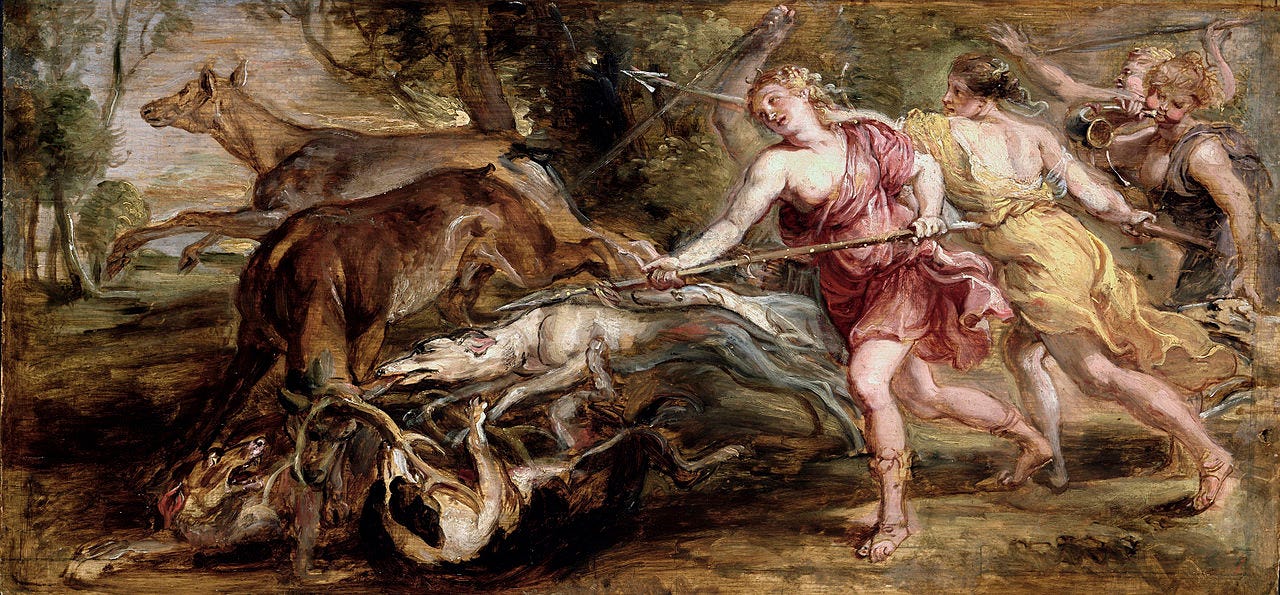
3. This week’s theme: Game on
‘At Wolf Hall we are all great hunters,’ Sir John boats, ‘my daughters too, you think Jane is timid but put her in the saddle and I assue you, sirs, she is the goddess Diana.’
Welcome to Bring up the Bodies. Wolf Hall was a story told over many years, from Cromwell’s childhood to his supremacy in the summer of 1535. This sequel will be told in months. We start in September, and it will be all over by May 1536. This should tell you that we are heading into an eventful year in Tudor history and the life of Thomas Cromwell.
If Wolf Hall was framed as a play, with theatrical epigraphs and plays-within-plays, a memory theatre at its heart, then Bring up the Bodies is set up as a game, a hunt: a bloodsport.
The opening image shows a falcon hunting its prey and returning to her master, Thomas Cromwell. “Her breast is gore-streaked and flesh clings to her claws.” The king spends his days hunting, “a riot of dismemberment, fur and feather flying.” In the evening, Edward Seymour and Cromwell play chess. He says, “Do you really mean to do that, Edward? I see my way to your queen.”
At the start of Wolf Hall, Mantel listed Cromwell’s impressive capacities: “He can draft a contract, train a falcon, draw a map, stop a street fight, furnish a house and fix a jury.” Here, she gets straight to the point:
He has a way of getting his way, he has a method; he will charm a man or bribe him, coax him or threaten him, he will explain to a man where his true interests lie, and he will introduce that same man to aspects of himself he didn’t know existed.
The message is plain: In the last book, Thomas Cromwell became the perfect performer, arranging his face and playing all the parts. In this book, Cromwell has turned up for a fight. And it is a fight he intends to win.
He thinks, Weston is goading me, he knows that in Henry’s presence I will not give him a check; he imagines what form the check may take, when he delivers it. Rafe Sadler looks at him out of the tail of his eye.
Mantel uses this expression twice. At the end of the chapter, Jane Seymour, “does not turn her head to acknowledge him, but she sees him from the tail of her eye.”
I wonder whether “tail” is repeated to remind us of the falcons and the “borrowed plumes” in the hunters’ hats. But it also suggests the watchful expressions of players at a table. Cromwell is “not in the habit of explaining himself”, and when the king mentions the cardinal, he makes sure “his expression is as carefully blank as a freshly painted wall.”
So here we are: September 1535. We were wolves at court. But now we wish to be those falcons in the sky.
Weightless, they glide on the upper currents of the air. They pity no one. They answer to no one. Their lives are simple. When they look down they see nothing but their prey.
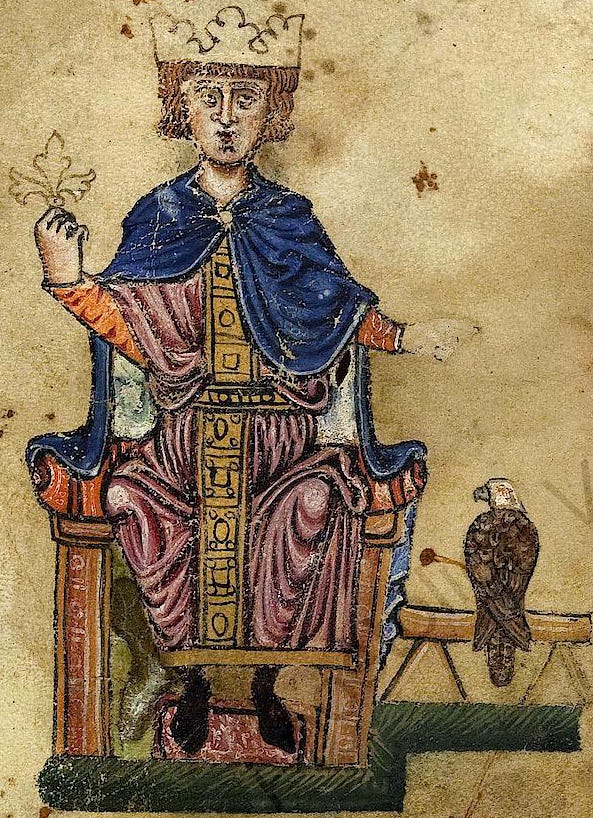
4. Footnote: ‘His children are falling from the sky’
Note that Bring up the Bodies begins with a falling image, mirroring the opening lines of Wolf Hall, “Felled, dazed, silent, he has fallen.” But whereas the first book starts on the cobbles, we are now high in the sky. How far we have come! On a good day, “the sky is so clear you can see into Heaven and spy on what the saints are doing.”
In the Wolf Hall Companion, Lauren Mackay writes:
Hawking or falconry, the hunting of small wild game or birds using highly trained birds of prey, had existed for centuries in Europe and Asia, and was something of a sport as well as an art form. It was one of the most popular sports of the aristocracy, among women and men alike, with Henry VIII rearing flocks of birds such as pheasant specifically for the sport.
In the 1240s, the Holy Roman Emperor Frederick II wrote the most significant medieval book on falconry: The Art of Hunting with Birds, which was also a pioneering work of ornithology and zoology. In the Bayeux Tapestry, we can see William of Normandy sailing to England with hawks and hunting dogs, resolute on conquest and good pastime.

Remember that Anne Boleyn incorporated a silver falcon into her heraldic shield. The falcon, which came from her Butler ancestors, symbolizes someone who does not rest until their object is achieved. Anne is not present in the first chapter, but the title reminds us that her story is central to the one unfolding in this book:
They search out and obliterate any trace of Katherine, the queen that was, smashing with hammers the pomegranates of Aragon, their splitting segments and their squashed and flying seeds. Instead – if there is no time for carving – the falcon of Anne Boleyn is crudely painted up on hatchments.
Falconry lives on in the English language, thanks partly to Shakespeare. A bird that is no longer hungry and has lost the will to hunt is fed up. A haggard bird is a wild raptor that is difficult to train. You keep your bird under your thumb, its tethers held tightly to stop it from flying away. To doubly secure it, you can wrap the jesses around your little finger. A hawk or falcon can be hoodwinked with a cover until you are ready to release it.
The collective noun for a group of falcons is a cast, which is rather appropriate for our book, beginning with its cast of characters.
But when falcons take flight, they may soar to a great height. And then we can call them a tower. Another useful word, going forward.
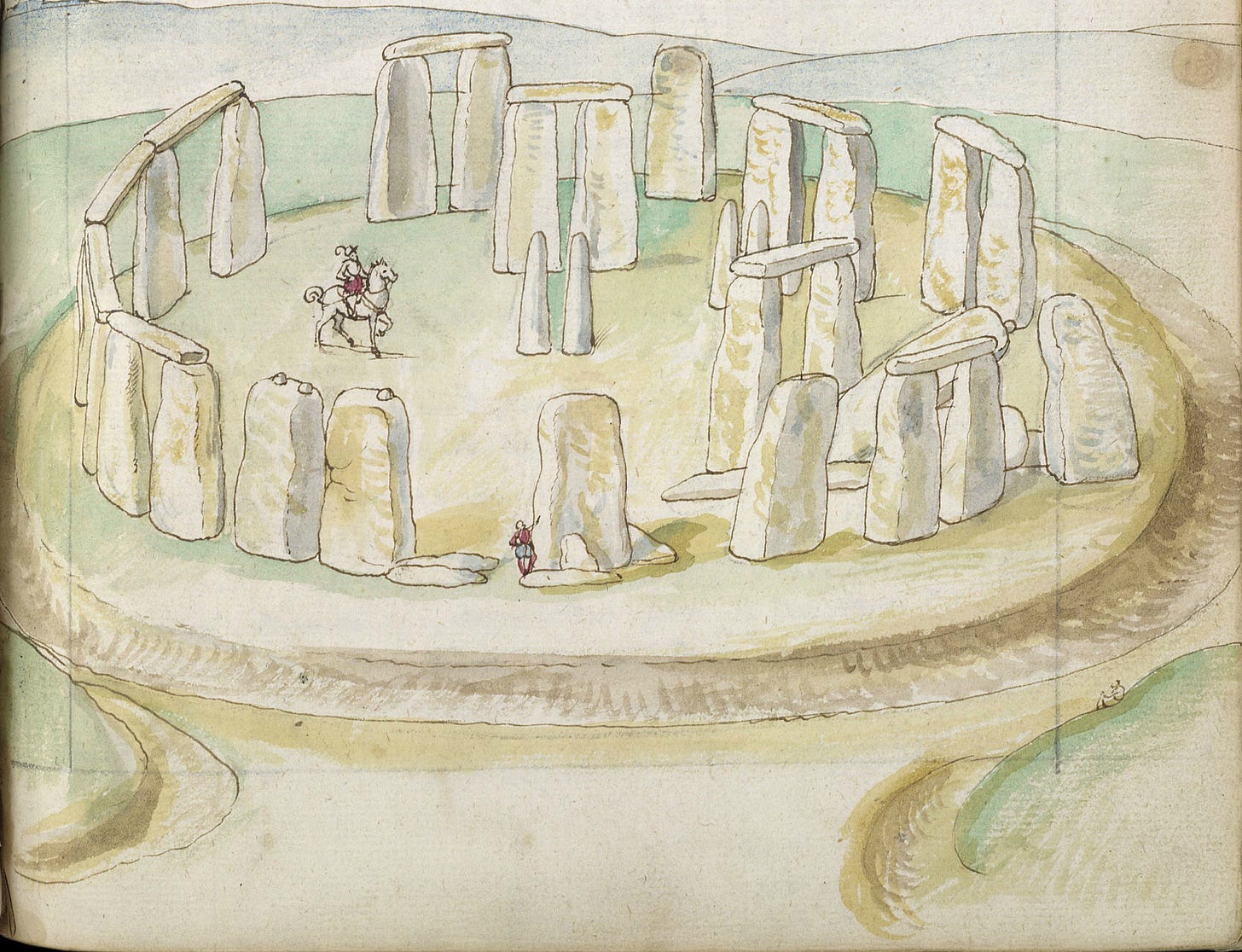
“In this part of England our forefathers the giants left their earthworks, their barrows and standing stones. We still have, every Englishman and woman, some drops of giant blood in our veins.”
Wolf Hall is in Wiltshire. The county lies on a chalk plateau called Salisbury Plain, rich in Neolithic archaeology including Stonehenge.
5. Tangent: ‘We may have one more fine day.’
Wolf Hall ended with a deluge, “a miserable dripping week in July.” The rain took on biblical proportions, the Thames “bubbling like some river in Hell”, and it had even begun to dampen Cromwell’s bullish good humour:
‘The world corrupts me, I think. Or perhaps it’s just the weather. It pulls me down and makes me think like you, that one should shrink inside, down and down to a little point of light, preserving one’s solitary soul like a flame under a glass. The spectacles of pain and disgrace I see around me, the ignorance, the unthinking vice, the poverty and the lack of hope, and oh, the rain – the rain that falls on England and rots the grain, puts out the light in a man’s eye and the light of learning too.’
In contrast, Bring up the Bodies starts with “perfect” summer days. “The clear untroubled light picks out each berry shimmering in a hedge. Each leaf of a tree, the sun behind it, hangs like a golden pear.”
This fine weather and fine hunting puts Cromwell in a pleasant place: “He is not the same man he was last year, and he doesn’t acknowledge that man’s feelings; he is starting afresh, always new thoughts, new feelings.”
But we are reminded that “there will not be many more days like these”, and beyond the untroubled light, “you can sense the shifting presence of the sea.” Autumn and winter are on their way, “and war is always keen to come again.”
It’s what’s latent in the soil, what’s breeding; it’s the days to come, the wars unfought, the injuries and deaths that, like seeds, the soil of England is keeping warm.
This conjures up an inverted image of fertility. In summer, the trees are laden, and the bushes are heavy with fruit. But death is waiting in the soil, ready to return and reap a new and bitter harvest.
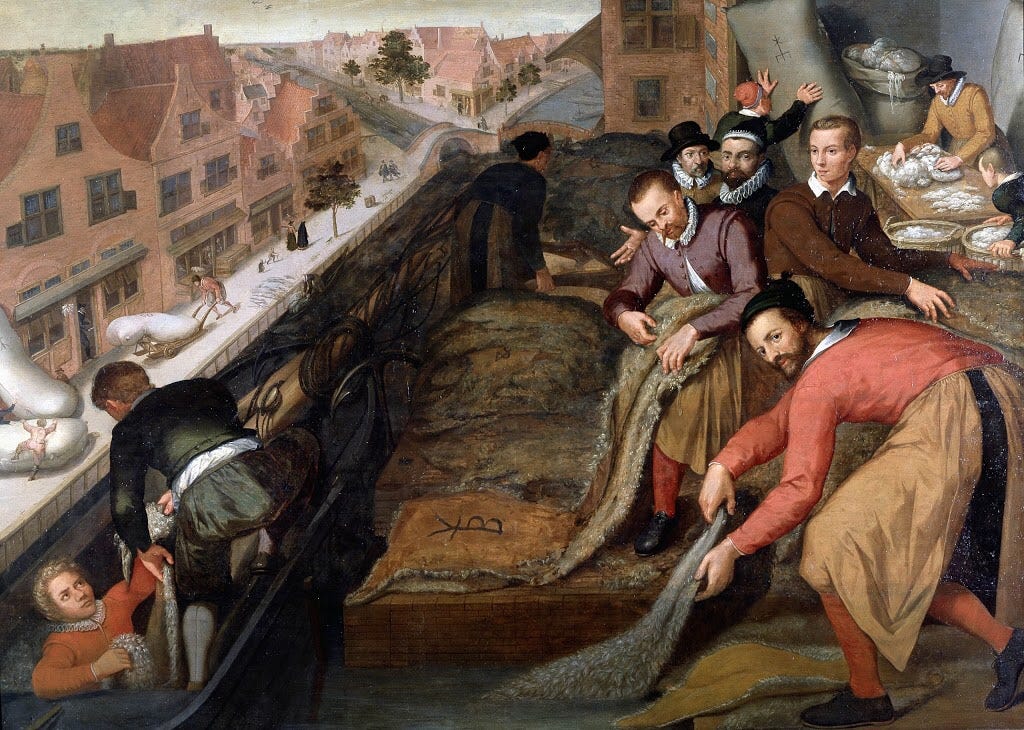
6. Footnote: Cut from a different cloth
He was a brewer and a blacksmith at Putney, a shearsman too, a man with a finger in every pie, a scrapper and brawler, a drunk and a bully, a man often hauled before the justices for punching someone, for cheating someone.
In Wolf Hall, Mantel sticks with the popular narrative that Thomas Cromwell was the son of a blacksmith. It’s the story I was taught at school. His mythic origins propel Wolf Hall forward. It is a simple narrative: rags-to-riches, from the heat of the smithy to the fires of Smithfield, from making the axe to wielding it. Figuratively speaking, you understand.
The truth is a bit more complicated. The Cromwells were not village peasants. They were yeomen. As Diarmaid MacCulloch puts it, “busy industrious folk who liked to see their promising boys get on in the world, and who valued schooling as the key to advancement.” With the right opportunities, and a bit of luck, a yeoman may hope to become a gentleman.
Walter Cromwell may have been a blacksmith. But he was into a bit of everything. MacCulloch again:
Any respectable way of making money would do; he had some land to farm around Putney and later in nearby Wandsworth and Roehampton, and he brewed beer on a commericial scale. That meant tavern-keeping near the waterfront, a good living at a time when the Thames was the equivalent of a modern main highway. Walter moved from Putney to Wandsowrth around 1501; his property there included a water-mill which could have been for either grain or cloth-fulling.
The Italian writer Matteo Bandello called Thomas Cromwell “the son of a poor cloth shearer”, and in the late 1530s “shearsman” stuck as a term of abuse for Cromwell’s base origins. Of course, any line of work that involved making money was anathema to the Tudor aristocracy. Weston thinks it is hilarious. But as the king notes in these opening pages, England’s economy depends on its shearsmen.
‘We would be a poor country without our wool trade. That Master Cromwell knows the business is not to his discredit.’
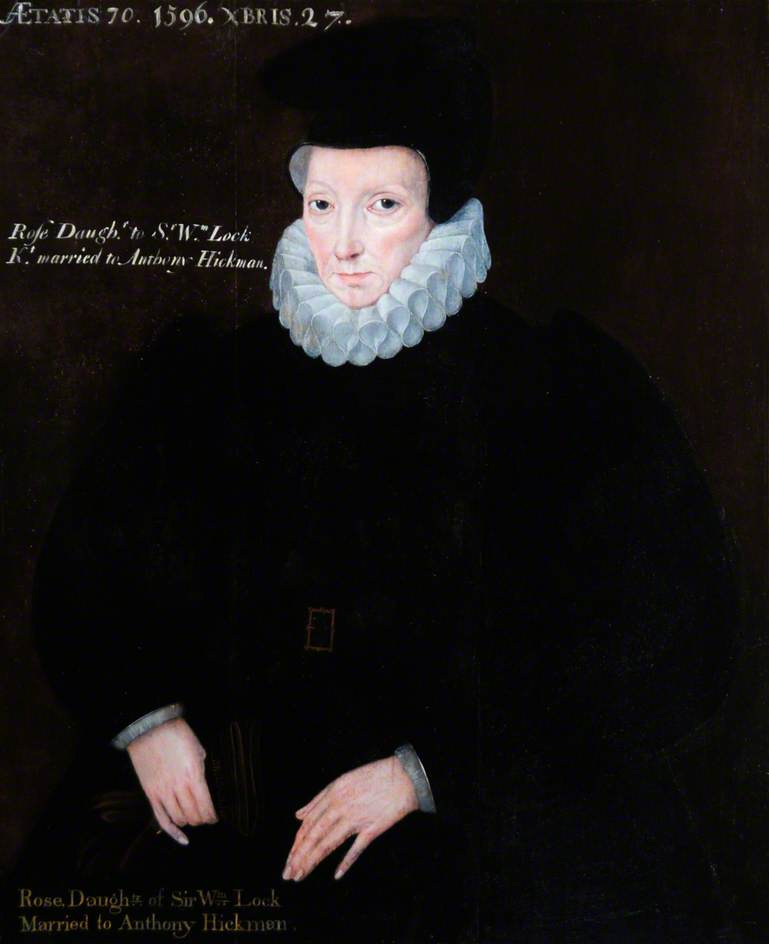
7. Footnote: On the education of women
Mantel uses John and Edward Seymour to explore the changing attitudes toward the education of women in the sixteenth-century. “I never troubled my girls in the schoolroom,” says old Sir John. His son Edward considers a little schooling a good idea for a merchant’s wife:
'It is not uncommon for the daughters of a city household to learn their letters and a little beyond. You might have wanted them in the counting house. One hears of it. It would help them get good husbands, a merchant family would be glad of their training.'
We saw in Wolf Hall how both Cromwell and Thomas More prioritised the education of their daughters. They were following the advice of Erasmus and a growing trend among the gentry and nobility. Jane says Mary Shelton is teaching her French. Shelton wrote her own poems and was part of a literary circle at court that included Thomas Wyatt. With two other women, Mary Fitzroy and Margaret Douglas, she compiled the Devonshire manuscript of collected verse.
Thomas More’s daughter, Meg Roper, appears at the end of the chapter, keeping her father’s head “in a dish or bowl, and saying her prayers to it.” It is of her that Anne Cromwell says: “Why should Thomas More’s daughter have the pre-eminence?” and insists on studying Greek.
Margaret Roper will go on to become one of the most learned women of the sixteenth-century, publishing her own work and translating Erasmus into English. The humanist scholar Richard Hyrde wrote the Introduction to Roper’s Treatise on the Paternoster, in which he defended women’s education against those who claim it is “neither necessary not profitable” and “very noisome and jeopardous.”
Jane’s brother Tom thinks it is a bit of a lewd joke that Jane is practising “the French tongue.” But this moment also emphasises the gulf in education and experience between the queen that is now, Anne Boleyn, and Jane Seymour, the queen to come.
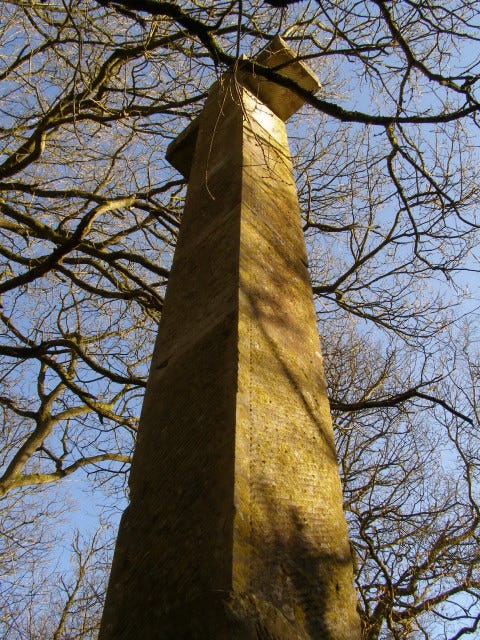
8. Footnote: Dead Man’s Plack
Upon discovering the earl’s treachery Edgar ambushed him, in a grove not far from here, and rammed a javelin into him, killing him with one blow.
The earl in Sir John’s story was called Æthelwald and the fair maiden’s name was Elfrida. The Seymours probably picked up the story from the twelfth-century historian William of Malmesbury. In the ninteenth-century, historians debunked the story as a “tissue of romance” but one antiquarian was so convinced of its truth that he erected a monument in memory of Æthelwald in Harewood Forest, Hampshire.
The stone cross is called Dead Man’s Plack, which is probably a corruption of “Dudman’s Platt”, platt meaning a plot of land. This is a perfect Mantel tangent: a medieval ghost story that may or may not be based on historical events.
'And the country folk say,' Sir John adds, 'that the false earl walks the woods still, groaning, and trying to pull the lance out of his belly.'
The story shimmers with possible meanings and foreshadowing. A jealous king killing his beloved subject over deceit and the love of a woman. Edgar the Peaceable is not especially peaceful. A few pages later we are told that our king “would be known as Henry the Valiant, except Thomas Cromwell says he can’t afford a war.” Edgar is not peaceful, Henry is not valiant, and all of this story may be nothing but lies.
‘Some of these things are true and some of them lies. But they are all good stories.’
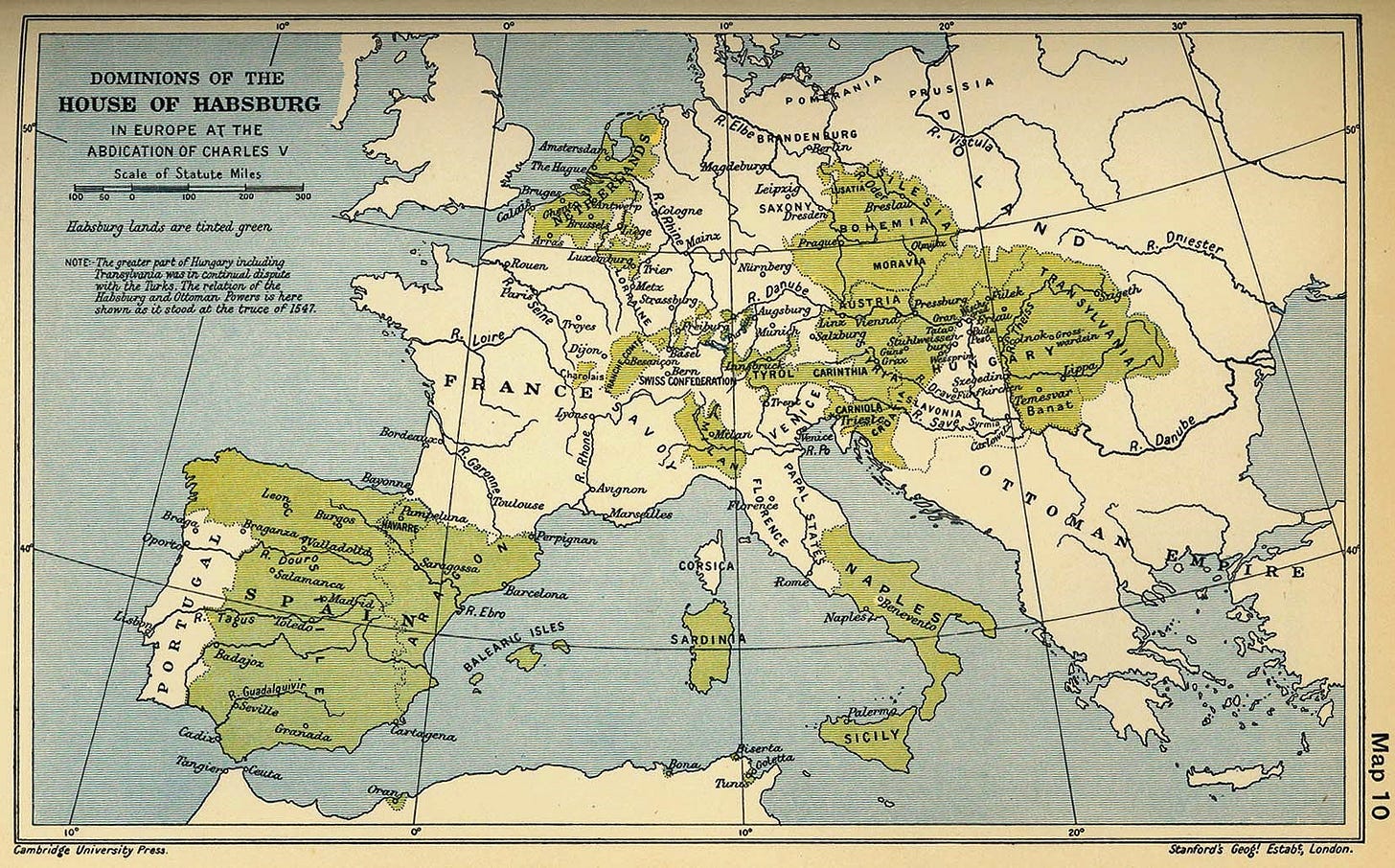
9. Footnote: Cromwell vs. Boleyn
'Anne? She is at outs with me. I feel my head wobble on my shoulders when she stares at me hard.'
Officially Master Secretary and Queen Anne are on the best of terms. They share the same religious agenda and Cromwell has spent the last six years labouring to put Anne where she is now. In previous weeks, we have discussed how historians have traditionally assumed that Cromwell and Anne were allies. As Diarmaid MacCulloch writes, their enemies considered it “self-evident that the heretical Queen and the heretical minister were hand in glove in efforts to destroy true religion.”
But in June 1535, the Imperial Ambassador Eustace Chapuys reported that Cromwell has told him the queen and minster had quarrelled, and the queen had said “she would like to see his head off his shoulders.” Chapuys wrote to his emperor:
I cannot tell whether this is an invention of Cromwell, in order to raise the value of what he has to offer. All I can say is that everyone here considers him Anne’s right hand, as I myself told him some time ago.
Here, Cromwell is being equally candid with Edward Seymour, who he considered “in every respect the king’s man.” He may have told Chapuys to confound England’s enemies, but he is telling Seymour for a different reason. He trusts him. And Edward Seymour is inclined towards religious reform. If there is to be a rift within the evangelical camp at court, Cromwell would very much like to have Seymour on his side.
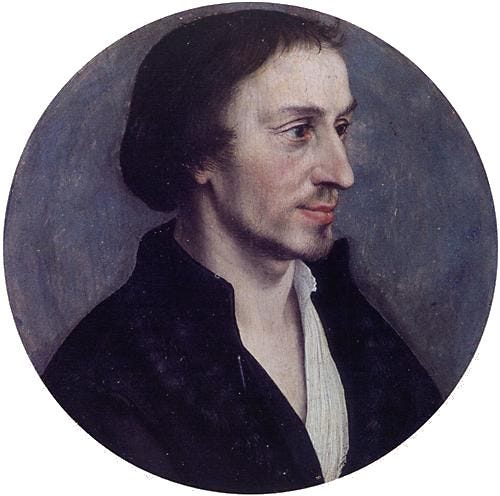
10. Footnote: Hearts and minds
‘You should read Philip Melanchthon. I will send you his new book. I hope he will visit us in England. We are talking to his people.’
Here’s the subtext behind this section. Remember that Henry VIII hates Martin Luther and that the king’s opposition to Lutheranism is a major obstacle for reformers like Cromwell in England. Philip Melanchthon is a Professor of Greek at Wittenberg University in Germany and he is what Diarmaid MacCulloch calls Cromwell’s trump card:
Despite being Luther’s right-hand man, he seemed immune from Henry’s hatred of Luther himself: the King respected his formidable reputation as a humanist scholar which outweighed that unfortunate reputation.
In 1535, King Francis invited Melanchthon to Paris. France was exploring its own possible alliance with the Schmalkaldic League of Protestant German provinces against the Emperor. Cromwell could utilise Henry’s rivalry with Francis to make their own competing invitation to Melanchthon and move closer to a diplomatic alliance with Protestant Germany.
Two evangelical scholars were sent off to Germany as envoys of the king. The initial result is the book Cromwell mentions to Edward Seymour, Melanchthon’s Loci communes. It is the first major Protestant book outside of England to be dedicated to Henry VIII. The preface flatters Henry’s commendation of both Anabaptists and monks, while the book itself moderates Luther’s stark theology, making it more amendable to the traditionally-minded monach of England.
11. Tangent: Weston’s Ghost
‘This is Francis Weston. You think he is helping put the king to bed, but in fact we have him here in ghostly form. We stood around a corner and waited for him with a magic net.’
It may be worth reminding everyone that Francis Weston was one of the four courtiers who played the roles of devils carrying Wolsey to hell in a play in 1530. The other three were Henry Norris, William Brereton, and Anne’s brother, George Boleyn.
And for more ghosts, paid subscribers can read this week’s instalment of The Haunting of Wolf Hall:
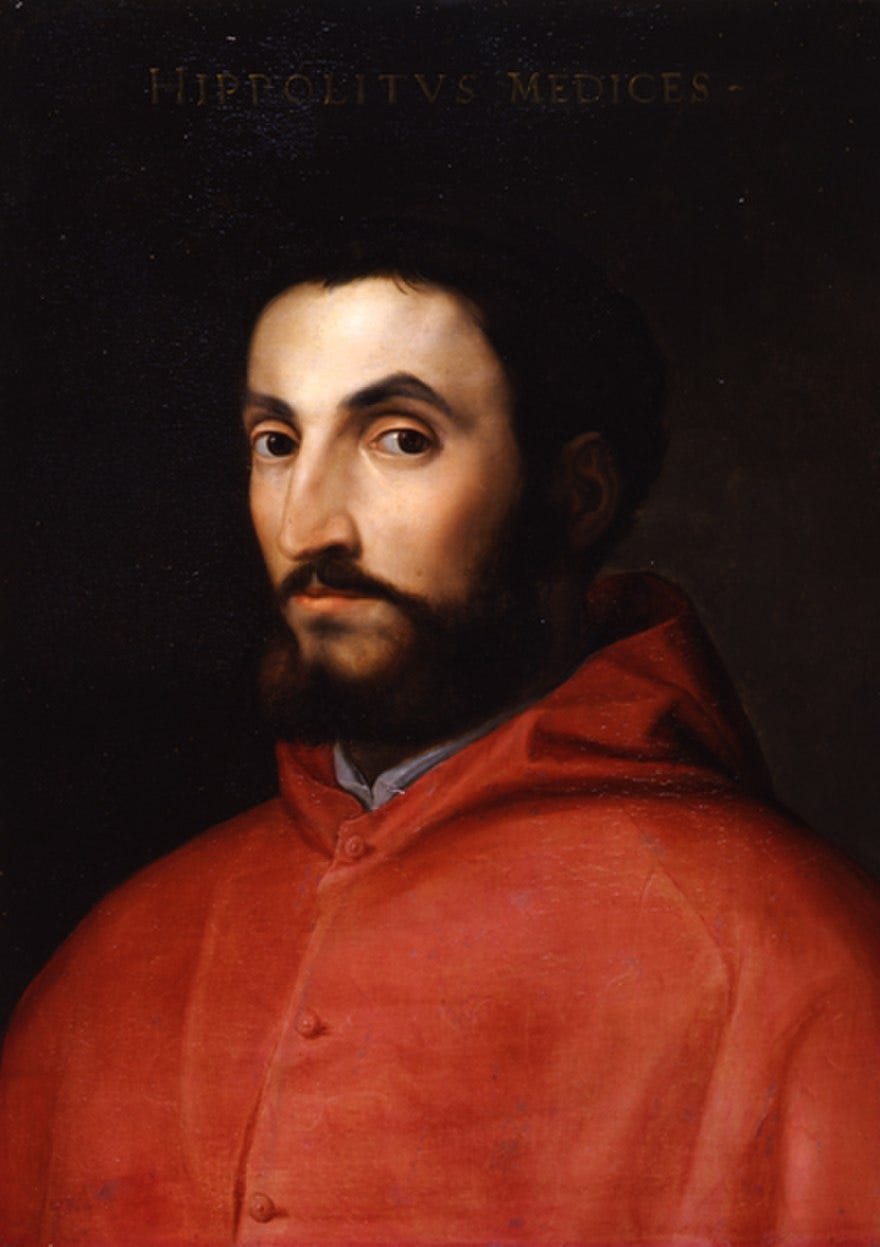
11. Foonote: The news of the world
This chapter does an enormous amount of heavy-lifting. It re-introduces Cromwell and most of the main characters, reminding us of where we are and what has happened. It should just about be possible for a new reader to pick up Bring up the Bodies without having read Wolf Hall. Although I can’t say I recommend it.
Cromwell’s intray is a simple narrative device to get us up to speed. The news reminds us that England still owns Calais, the last scrap of English territory in France. The poisoned Medici cardinal is Ippolito de’ Medici. He probably died of malaria, but there were plenty of rumours that his relatives or even the pope were behind his untimely death. Grain hoarders and food riots remind us of the unrest in York at the end of Wolf Hall, and the ever-present possibility of more widespread rebellion.
The Muscovite victory in Poland is part of an ongoing conflict between the Grand Duchy of Moscow and the allied forces of Lithunia and Poland. Muscovite gains culminate in 1547 with the unification of Russia under Ivan the Terrible.
And finally…
Letters from foreign rulers, wishing to know if it is true that Henry is planning to cut off the heads of all his bishops.
The beheadings of Bishop Fisher and Thomas More sent shockwaves through Catholic Europe. Fisher was in his sixties and severely ill. More was an internationally respected scholar. France, Spain and Rome were united in outrage and the killings made it abundantly clear that England had no intention of returning to the Universal Church.
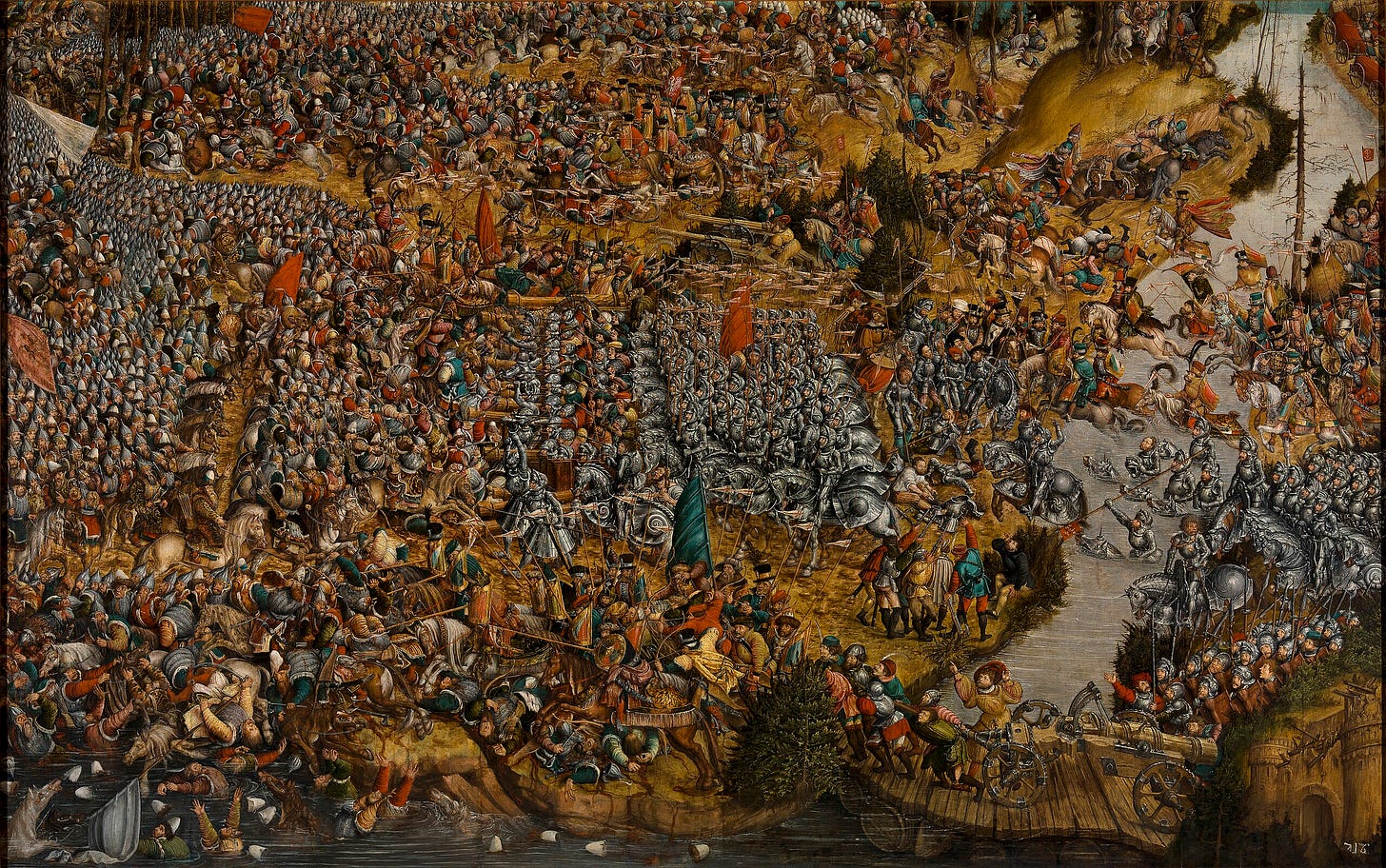
12. Quote of the week: Root bride
Cromwell, like Jane Seymour, doesn’t believe in ghosts. And yet sometimes, “when he is on the verge of sleep the cardinal’s large scarlet presence flits across his inner eye.” With Cromwell, tiredness always weakens the walls between the real and the phantasmal. “You may find a bride in the forest, old Seymour had said.”
When he closes his eyes she slides behind them, veiled in cobwebs and splashed with dew. Her feet are bare, entwined in roots, her feather hair flies into the branches; her finger, beckoning, is a curled leaf.
These days are perfect, but full of uncertainty. Full of threat and veiled menace, “hidden among the trees.” He, Cromwell, must see beyond this summer, past the next move on the board, and sense what is coming, whether good or ill:
At the edge of his inner vision, behind his closed eyes, he senses something in the act of becoming. It will arrive with morning light; something shifting and breathing, its form disguised in a copse or grove.
13. Next week
Thank you for reading and joining me on this slow read of the Cromwell trilogy. Next week we will read the first part of “Crows, London and Kimbolton, Autumn 1535” up to the section ending, “If she should die within the year, I wonder what world would be then?” on page 75 of the Fourth Estate paperback edition.
Before I go, a quick reminder that this book group is entirely funded by its readers. So, if you have enjoyed this post and found it helpful, please consider a paid subscription to access the bonus posts on The Haunting of Wolf Hall and start your own discussion threads in the chat area. You can also donate to my tip jar on Stripe. Thank you so much for all your support.
Until next week, I am your guide,
Master Simon Haisell




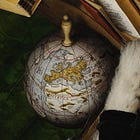
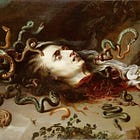
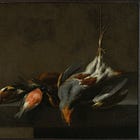
Totally forgot to mention one of my favourite lines: "I was just resting my eyes." How to make a king look like your dad, sinking into the sofa at the end of a long day. Such a human moment.
Still marvelling at how well constructed this first chapter is: the story of King Edgar is a hunting scene in a forest, where the king hunts his own servant (killing him with one blow). Rafe and Gregory hunt Francis Weston's ghost and catch him with a net.